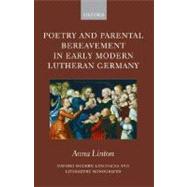Poetry and Parental Bereavement in Early Modern Lutheran Germany
, by Linton, Anna- ISBN: 9780199233366 | 0199233365
- Cover: Hardcover
- Copyright: 6/15/2008
In early modern Europe it has been estimated that up to one in two children did not survive to the age of ten. In the light of this high mortality rate, some historians have argued that parents did not form close relationships with their children, especially the very young. This is clearlyrefuted by the testimony of bereaved parents such as Martin Luther, and by the volume of consolatory writings produced for grieving families in early modern Lutheran Germany. The authors, clergymen and lay people, regarded grief as a deep wound which required treatment, and they applied the balm ofconsolation through sermons, tracts and occasional poetry. This study analyses these writings, focusing particularly on the neglected genre of the epicedium (funeral poem). It asks how and why poetry was used to counter the affective impact of parental bereavement, and considers what makes it asuitable vehicle for consolation. The poems, which are analyzed against the contemporary theological, philosophical, and poetological background, are taken from Leichenpredigten (printed funeral booklets), as well as from collections by two contrasting poets, Paul Fleming (1609-40), an unmarried manwho wrote to console others, and Margarethe Susanna von Kuntsch (1651-1717), who lost thirteen of her fourteen children. The study seeks to rehabilitate a neglected genre and participates in discussions on the sociology of death, Lutheran teachings about death and mourning, literary presentations ofmortality and loss, and the depiction of children and parent-child relations in literature.






